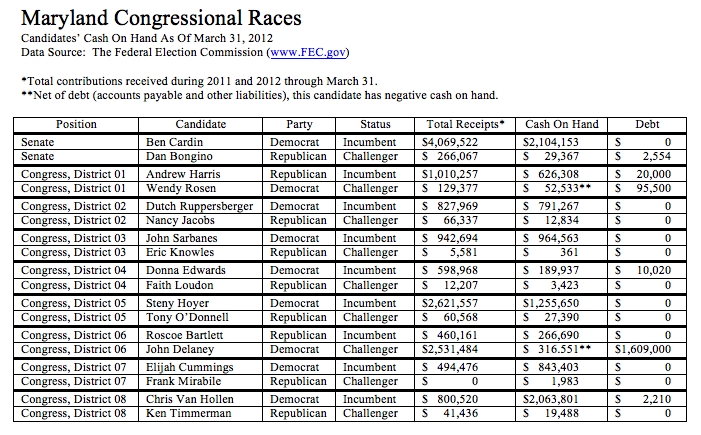 Sunday, June 3, 2012
Sunday, June 3, 2012
The big reason is money. Almost regardless of what they do or don’t do while they’re in office, incumbents tend to be re-elected because their campaigns raise so much more money than their opponents’.
Most voters have no real idea what their incumbents have been doing in Washington. Who they vote for is largely based on campaign rhetoric. Money buys organization and advertising. The more money you have, the more likely you are to win, and that’s that. It’s unfortunate, but Congressional campaigns aren’t so much about ideas as they are about dollars.
And we’re not talking about only a few dollars difference between incumbents and their challengers. Take a look, for example, at the following table showing total receipts and cash on hand for Maryland Congressional races. (I compiled the table from FEC individual candidate data available on-line at www.FEC.gov. All data are as of March 31, 2012.) Maryland is a relatively small state with only eight Representatives. Round numbers, two-thirds of the registered electorate is Democrat, one-third Republican.

Pairs of rows for each of the nine Congressional races show the incumbent first, then the challenger. Of the nine races, seven of the incumbents are Democrats, two are Republicans.
Notice how much more the incumbents have raised, and that they have taken in substantially more than they have spent, enabling them to build very significant reserves to spend on advertising late in the campaign when it counts most.
In every case, with one exception that I’ll discuss below, the incumbent, regardless of party affiliation, has dramatically more cash on hand than his or her opponent. Dramatically. The dollar amounts aren’t even close.
Some of the cash on hand amounts for challengers are so low as to be functionally zero. Their campaigns are surviving day to day on relatively low levels of individual supporter contributions, spending nearly every dollar they get to keep their campaigns going, while the better funded incumbents are hoarding cash to spend during the last 30 days prior to the election.
The one exception would appear to be in Maryland’s sixth district where Republican Roscoe Bartlett, who is 85 years old and has been serving in Congress since 1993, has less cash on hand than his opponent, John Delaney. But note: As you can see in the far right column, Delaney is one of two candidates – Wendy Rosen in District 01 is the other. – whose campaign’s owe more money than the cash they are holding. Despite having raised an impressive $2,531,484 in the past two years to date, Delaney has only $316,551 on hand and debt of $1,609,000.
Incidentally, Mr. Bartlett, the incumbent who, given his age, is nearing the end of his career in Congress, has raised only $460,161 to date, through March 31, of which he still has $266,690 on hand. Of 242,189 votes cast in District 06 in 2010, 148,820 (61.45%) were cast for Mr. Bartlett.
Money, if you’re the challenger, buys advertising, usually negative radio and television spots that are essential to defeating the incumbent. Money, if you’re the incumbent, can buy the organization and marketing you need to make sure voters appreciate all the great work you tell them you’ve been doing for them. (Notice how I put that. Most voters only know what the candidates tell them, which is why campaign advertising works.)
Until we have comprehensive, effective campaign finance reform, having money will continue to determine who wins. Having money, as you can see from the table above, tends to perpetuate incumbents in office regardless of their performance. And you wonder why it’s “business as usual” in Washington, year in and year out, regardless of how low our opinion of Congress?
Maybe you’ve noticed that the ratios of incumbent cash on hand to challenger funds are not in keeping with the ratio of party registration in Maryland. Why, for example, does Senate incumbent Ben Cardin have 72 times as much cash on hand as his opponent, Republican newcomer Dan Bongino, when Democrats outnumber Republicans in Maryland by only two to one? The simple answer is that, at least as of March 31, Republican “money” doesn’t believe Dan Bongino can beat Ben Cardin, and is understandably reluctant to commit resources until it does. Ironically, that commitment of Republican money might never happen, because without it, the Bongino and other Republican challenger campaigns may not be able to afford to get their poll numbers within striking distance, close enough to attract Republican party and PAC money.
If you’re a supporter of challenger campaigns or primarily interested in throwing the incumbent out, pay attention. If you don’t ante up, and get your family and friends to do the same, for most of you the chances of unseating the incumbent are nil. Your contributions – and anti-incumbent campaign expenditures Next Contestant might make or encourage – are essential to jumpstart challenger campaigns in the polls until big money, from the parties and PACs, steps up.
-Next Contestant

